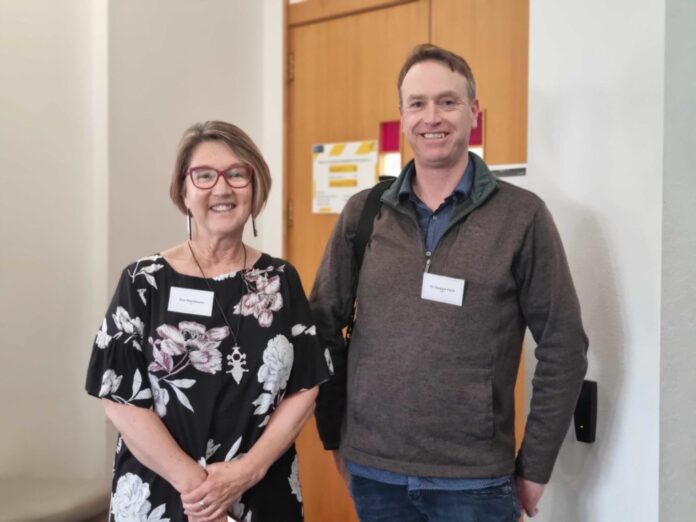Source: Eastern Institute of Technology – Tairāwhiti
3 mins ago
EIT Head of the school of Viticulture and Wine Science, Sue Blackmore and keynote speaker, Dr Stewart Field, from NMIT, at the EIT wine research symposium.
An inaugural wine research symposium, attended by representatives from industry and researchers from universities, crown research institutes and polytechs around the country, was held at EIT’s Hawke’s Bay Campus last week.
Hosted by the School of Viticulture and Wine Science, the symposium, called Advancing Viticulture and Wine related research, featured researchers from EIT, the University of Auckland, Nelson-Marlborough Institute of Technology (NMIT), Lincoln University, and the Bragato Research Institute (BRI), LandWISE and Ag Research.
The aim of the symposium, which was held on Thursday, was to provide a platform to present New Zealand research to industry and help develop collaboration for future wine industry related research.
Head of EIT’s School of Viticulture and Wine Science, Sue Blackmore, says the symposium was a success, with strong interest from researchers to present and a good turn out from industry and research organisations on the day.
COVID-19 and alert level restrictions put running the symposium in doubt and provided challenges for the presenters who came from across the country. We are thankful it could be held with onsite as well as digital presentations from Auckland and Hamilton.
“Having this symposium is a fantastic way for us to network with organisations and encourage collaboration.”
She hopes this is the start of more to come, with another potentially in the works for next year.
About 50 people attended throughout the day to hear 15 speakers share their research across four sessions; viticulture, Pinot Noir chemistry, applied oenology and wine supply chain infrastructure.
The latter looked at resilience within the industry to COVID-19 and the recent earthquakes, and the opportunities and challenges that have arisen. Meanwhile, the viticulture session focused on measure to modify conditions in the vineyard to control weeds, adjust vine nutrition and maximise quality wine grape production.
Pinot Noir chemistry and Applied Oenology was aimed at understanding the expression of the typicity of NZ Pinot noir and NZ Sauvignon Blanc. How the sensory and the chemical components match up and how these can be measured chemically and manipulated in the vineyard.
Dr Stewart Field, former viticulture lecturer, and researcher at EIT, now at NMIT, gave the keynote address and spoke on how soil temperature prior to version alters grapevine partitioning, Xylem sap hormones and fruit set in Syrah.
His talk was based on a paper that he and his co-authors were awarded the 2021 Best Viticulture Paper by the American Society for Oenology and Viticulture (ASEV).
They assessed the effects of soil temperature (14˚C or 24˚C) between bloom and veraison on growth, non-structural carbohydrates, cytokinins, abscisic acid, and leaf function of potted Shiraz grapevines.
Stewart says they found soil temperature significantly affects grapevine growth and that the responses are mediated largely by an influence of temperature on mobilization of reserve carbohydrates from the roots.
He enjoyed being back at EIT and presenting his findings. “It’s good that EIT set this up as there isn’t much of an avenue to present New Zealand research particularly during this COVID-19 time.”
Four current EIT researchers also presented papers. Viticulture and Wine Science lecturer Dr Chandré Honeth spoke about using deficit irrigation to modulate Syrah quality parameters.
Dr Victor Ye presented on the characterisation of commercial examples of New Zealand Sauvignon Blanc, while his colleague Jane Qin spoke on wine composition of Pinot Noir as affected by leaf area to crop load ratio.
Closing out the day, Dr Rory Hill, Programme Coordinator and Lecturer – Wine Business and Innovation, gave a presentation entitled: Through a glass, darkly: what do we know about restaurant wine sales by the glass.
EIT started a new Masters in Wine Business and Innovation programme this year, with Rory as the programme coordinator.



